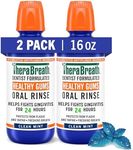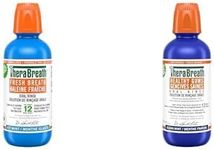Buying Guide for the Best Mouthwash For Gum Disease
Choosing the right mouthwash for gum disease can make a big difference in your oral health. The right product can help reduce inflammation, control bacteria, and support healing, but not all mouthwashes are created equal. It's important to understand the key features that make a mouthwash effective for gum disease, so you can select one that matches your needs and preferences. Consider your specific symptoms, any sensitivities you may have, and how easy the product is to use regularly.Active IngredientsActive ingredients are the chemicals or natural substances in the mouthwash that actually work to fight gum disease. Common ones include chlorhexidine, cetylpyridinium chloride, essential oils, and hydrogen peroxide. This is important because different ingredients target bacteria, inflammation, or plaque in different ways. Some are prescription-only and very strong, while others are milder and available over the counter. If you have severe gum disease, you might need a stronger, prescription formula, but for mild cases or maintenance, a gentler, over-the-counter option may be enough. Always check for ingredients that address your specific needs, and consult your dentist if you’re unsure.
Alcohol ContentAlcohol is often used in mouthwashes as a carrier for other ingredients and to help kill bacteria. However, it can also cause dryness and irritation, especially if you have sensitive gums or mouth tissues. Mouthwashes can be divided into alcohol-based and alcohol-free types. Alcohol-based ones may feel stronger and give a burning sensation, while alcohol-free options are gentler and better for people with sensitivities or dry mouth. If you find alcohol irritating or have a dry mouth, choose an alcohol-free mouthwash.
Antibacterial PropertiesAntibacterial properties refer to how well the mouthwash can reduce or control the bacteria that cause gum disease. Some mouthwashes are specifically formulated to target the bacteria responsible for gum inflammation and bleeding. These are usually labeled as 'antibacterial' or 'antimicrobial.' If your main concern is fighting infection and reducing bacteria, look for a mouthwash with proven antibacterial action. If you’re just looking for fresh breath, a regular mouthwash may not be enough for gum disease.
Fluoride ContentFluoride is a mineral that helps strengthen teeth and prevent cavities, but it can also support overall oral health. Some mouthwashes include fluoride, which is helpful if you’re also concerned about tooth decay along with gum disease. If you have a history of cavities or your dentist recommends extra protection, a fluoride mouthwash can be a good choice. If your main focus is just gum health, fluoride may not be as critical.
Taste and SensationTaste and sensation refer to how the mouthwash feels and tastes when you use it. Some people prefer a strong, minty flavor, while others need something mild due to sensitivity. Mouthwashes can range from very strong and medicinal to mild and pleasant. If you dislike strong flavors or have a sensitive mouth, look for a product labeled as gentle or mild. If you like a fresh, clean feeling, a stronger flavor might be more satisfying.
Ease of UseEase of use covers how simple it is to incorporate the mouthwash into your daily routine. Some mouthwashes require longer rinsing times or have specific instructions, while others are quick and straightforward. If you have a busy lifestyle or struggle to keep up with routines, choose a mouthwash that is easy to use and fits your schedule. The easier it is to use, the more likely you are to stick with it and see results.












